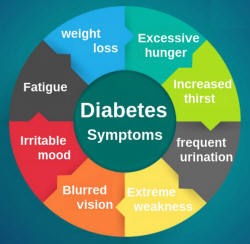
Causes & Symptoms
Causes
Scientists around the globe have conducted extensive research
on the factors behind diabetes. The exact causes, nevertheless,
remain elusive. To put it into the simplest of terms, diabetes
is caused when the body fails to convert the glucose in the
blood into energy.
It is interesting that some researchers are of the opinion that
a virus can cause this disease in youths. Certain viruses are
believed to increase the chances of developing type 1 diabetes,
especially in people with the HLA gene. Viruses like
cytomegalovirus, coxsackie B virus, adenovirus, mumps virus,
rubella virus, and the Epstein Barr virus have the potential to
either infect the insulin-producing cells or instigate their
autoimmune obliteration.
Table 1 below details the causes in types 1 and
2 of diabetes.
| Causes of Diabetes (Types 1 & 2) | ||
| Type 1 | Type 2 | |
| Preventable? | No | Yes, by following a balanced diet, routinely exercising, and adopting a healthy lifestyle. |
| Virus-triggered? | Possibly | No |
| Body type? | Thin or normal weight | Overweight |
| Genetics? | Mild genetic tendency: People with the Human Leukocyte Antigen (HLA) gene are at risk. | Strong genetic tendency to be common among family members. |
| Caused by? |
Autoimmune Disease: The patient’s own immune system attacks and kills the beta cells, which are released by the Pancreas to produce insulin, after mistakenly considering them “foreign” entities trying to cause an infection. |
Metabolic Condition: The insulin-making cells malfunction, resulting in insulin deficiency. |
| Timing? | Affliction can happen in any stage of life, but onset is more likely during teenage and childhood years. | Affliction usually takes place after 40 years of age, but overweight people are also at risk. Some young people develop this condition due to genetics. |
Symptoms

Type 1 Diabetes
There are many signs that may indicate a person having
type 1 diabetes. The rapid onset of these signs requires
swift medical action. Extreme fatigue, unusual thirst,
increased urination frequency, unexplained weight loss, and
blurred vision are the prominent symptoms of type 1
diabetes.
Ignoring these symptoms exacerbates the condition and paves
the way for other symptoms to appear. There are other less
common symptoms for type 1 diabetes. These include a dry and
itchy skin, tingling sensation in feet, lengthy healing time
of sores, yeast infections, nausea, and frequent genital
infections in females.
Type 2 Diabetes
The symptoms for type 2 diabetes are so slow that it is
often rendered as the “silent disease.” Many individuals go
on for years without realizing that they have had this
disease. One preventive measure is to get regular medical
checkups. Patients feel and notice the symptoms only after a
long time.
The symptoms of type 2 diabetes are similar to that of type
1 diabetes. Common symptoms include severe thirst,
unexplained weight gain or loss, fatigue, and increased
urination. Less prominent signs include dry mouth, dry and
itchy skin, slow healing, numbness in feet, vomiting,
excessive sleep, and female vaginal infections.